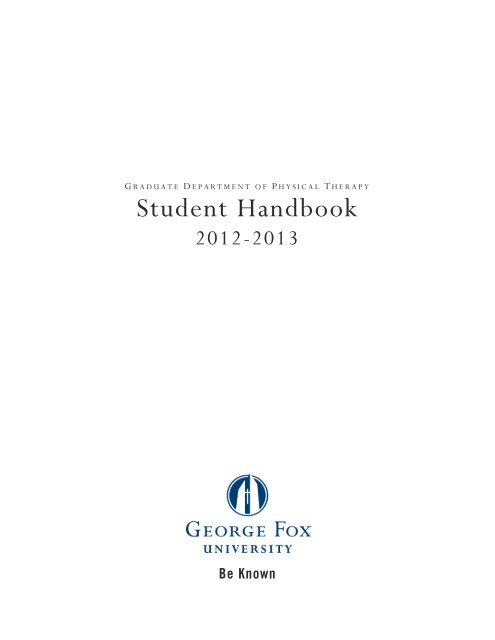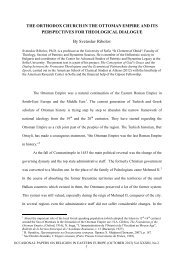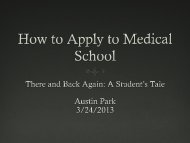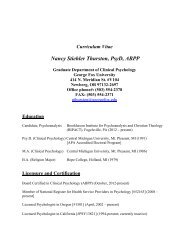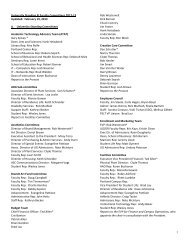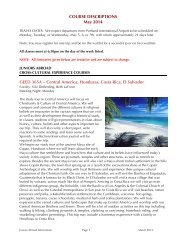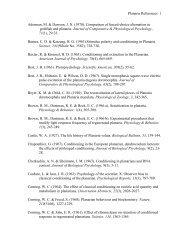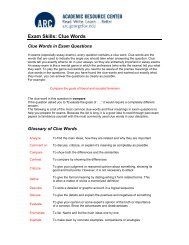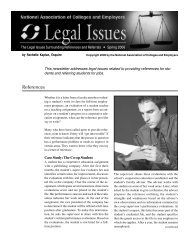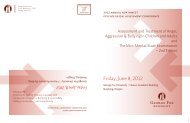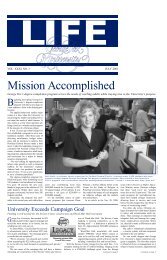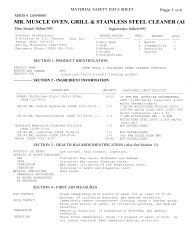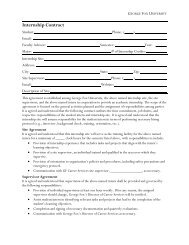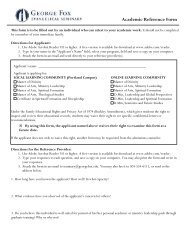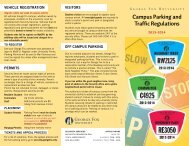Student Handbook - George Fox University
Student Handbook - George Fox University
Student Handbook - George Fox University
Create successful ePaper yourself
Turn your PDF publications into a flip-book with our unique Google optimized e-Paper software.
G R A D U A T E D E P A R T M E N T O F P H Y S I C A L T H E R A P Y<br />
<strong>Student</strong> <strong>Handbook</strong><br />
2012-2013<br />
Be Known<br />
STUDENT HANDBOOK 2012‐13 <br />
Graduate Department of Physical Therapy <br />
<br />
Introduction <br />
The <strong>Student</strong> <strong>Handbook</strong> outlines the mission, goals and objectives, and philosophy of the Graduate <br />
Department of Physical Therapy at the <strong>George</strong> <strong>Fox</strong> <strong>University</strong> (GFU). It also contains department policies <br />
and procedures that affect students enrolled in the Doctor of Physical Therapy (DPT) program. The <br />
policies are intended (1) to protect and make explicit student rights and responsibilities, and (2) to <br />
insure that DPT program operation is consistent with its obligations as a professional physical therapist <br />
education program. <br />
<br />
In addition, the program provides a Clinical Education <strong>Handbook</strong> designed for use by students as well as <br />
clinical instructors. <br />
<br />
<strong>Student</strong>s are responsible to be familiar with the contents of both handbooks and to seek verification of <br />
any questions regarding the contents. <br />
<br />
<br />
<br />
Tyler Cuddeford PhD, PT <br />
Associate Professor of Physical Therapy <br />
Director ‐ Physical Therapy Program <br />
<br />
Compliance with accreditation <br />
<strong>George</strong> <strong>Fox</strong> <strong>University</strong> is accredited by the Northwest Commission on Colleges and Universities which is <br />
recognized by both the Commission on Higher Education and the US Department of Education. <br />
<strong>George</strong> <strong>Fox</strong> <strong>University</strong> is seeking accreditation by the Commission on Accreditation in Physical Therapy <br />
Education (1111 North Fairfax Street, Alexandria, VA 22314; phone; 703‐706‐3245; <br />
accreditation@apta.org). The program has submitted an Application for Candidacy, which is the formal <br />
application required in the pre‐accreditation stage. Submission of this document does not assure that <br />
the program will be granted Candidate for Accreditation status. Achievement of Candidate for <br />
Accreditation status is required prior to implementation of the professional/technical phase of the <br />
physical therapy program; therefore, no students may be enrolled in professional or technical courses <br />
until Candidate for Accreditation status has been achieved. Further, achievement of Candidate for <br />
Accreditation status does not assure that the program will be granted Accreditation. <br />
Process for filing a complaint can be found at the CAPTE website: www: CAPTEonline.org <br />
Non‐discrimination policy <br />
Commission on Accreditation in Physical Therapy Education <br />
1111 North Fairfax Street <br />
Alexandria, Virginia 22314 <br />
Email: accreditation@apta.org <br />
Ph: (703)‐684‐2782 or (703)‐706‐3245 <br />
<strong>George</strong> <strong>Fox</strong> <strong>University</strong> students work and live in an environment where the dignity of each individual is <br />
respected. Demeaning gestures, threats of violence, or physical attacks directed toward another person <br />
are not tolerated. This includes hazing or other initiations or any actions that may be hazardous, <br />
dehumanizing, harassing, or humiliating to community members. Also included is the use of telephones, <br />
United States or campus mail, or e‐mail for the purpose of issuing obscene, harassing, or threatening <br />
messages. In addition, vandalism of property is unacceptable. <strong>Student</strong>s are expected to maintain an <br />
educational and workplace environment free from unlawful discrimination and harassment, and to <br />
conduct themselves in a manner that ensures no discrimination or harassment occurs. <br />
Discrimination or harassment due to race, color, sex, sexual orientation, marital status, religion, creed, <br />
age, national origin, citizenship status, workers' compensation status, physical or mental disability, <br />
veteran status, or any other status protected under applicable local, state, or federal law; or any other <br />
distinguishing characteristic protected by non‐discrimination law, is prohibited. <br />
The faculty recognizes the need for, and is committed to, the education of Physical Therapists <br />
representative of our diverse American population, to include men and women of any ethnic and <br />
cultural backgrounds. <br />
<br />
Technical standards, essential functions and students with special needs. <br />
In keeping with the central tenets of its mission – teaching, faith, and service – <strong>George</strong> <strong>Fox</strong> <strong>University</strong> is <br />
committed to the full access and inclusion of all qualified students in its programs. It is the policy of the <br />
<strong>University</strong> to ensure that students with disabilities have equal opportunity for participation in the <br />
<strong>University</strong>’s academic programs and activities, in accordance with Section 504 of the Rehabilitation Act <br />
of 1973 and the Americans with Disabilities Act. Some students may need reasonable accommodation <br />
for conditions in order to participate fully in the DPT program. <strong>Student</strong>s must contact the Disability <br />
Services Office (DSO) as early as possible. If you currently have a DSO Accommodation Plan, please <br />
discuss your accommodations with your professors and your advisor at the start of each semester, in <br />
order to optimize your learning opportunities. <br />
<br />
Important: The DPT program includes multiple lab experiences and off‐campus clinical placements. <br />
<strong>Student</strong>s may need additional or different accommodation arrangements for these lab and clinical <br />
components of the program. It is the student’s responsibility to meet with the DSO and the DPT Program <br />
Director’s designee at least one month before the start of the lab experience and/or clinical placement <br />
in order to review the student’s accommodation needs for the lab and/or clinical experience. <br />
<br />
Minimal Abilities for Eligibility to Participate in the Doctor of Physical Therapy Program at GFU. <br />
<br />
The DPT program statement incorporates the <strong>University</strong> policy and is more specific to the technical <br />
standards of physical therapy, in preparing students to fulfill the professional role of practicing physical <br />
therapists. These technical standards are outlined in the table below: <br />
Essential Performance Functions for Success in the School of Physical Therapy and are designed to <br />
provide full access to learning opportunities for all students while respecting the professional duty to <br />
ensure client/patient safety and well‐being while facilitating healing. The use of a trained intermediary <br />
would mean that a candidate's judgment is mediated by someone else's power of selection and <br />
observation. Therefore, third parties cannot be used to assist students in accomplishing curricular <br />
requirements. <br />
A significant component of a practicing physical therapist is the assessment and treatment of movement <br />
disorders. <strong>Student</strong>s must be able to perform the following essential functions with or without <br />
reasonable accommodation in order to fully participate in the DPT program. The following table is not a <br />
comprehensive listing of the functions of a physical therapist; these essential functions are stated to <br />
assist faculty and potential and/or currently enrolled students to: <br />
<br />
1) Decide whether to enter the School of Physical Therapy; <br />
2) Assess the student’s ability to progress in the program; and/or <br />
3) Determine the nature/extent of accommodation that might be necessary for equal participation in <br />
the program. Please note that students are responsible for requesting accommodations for a <br />
disability, in advance. <br />
<br />
The student must be able to perform these minimal abilities prior to beginning the didactic portion of <br />
the educational program and prior to any clinical affiliation. Included in the handbook is a minimal <br />
abilities acknowledgement form that each student must complete. This form acknowledges that you <br />
meet the minimal abilities. If you are unable to meet these performance functions you will not be <br />
allowed to continue in the program. <br />
<br />
<br />
Ability <br />
Standard <br />
Critical Thinking <br />
Critical thinking and reasoning sufficient for clinical <br />
judgment. This includes ability to measure, calculate <br />
and analyze. This requires ability to recall relevant <br />
events or research and incorporate these with a <br />
current patient/ circumstance. <br />
Behavioral skills <br />
Emotional health, ability to exercise sound judgment, <br />
the ability to develop mature and effective <br />
relationships with co workers and patients. Must be <br />
able to continue to function even under stress of <br />
outside distractions. <br />
Communication Skills <br />
Communicate easily, effectively and with sensitivity <br />
with patients and staff. Communication includes <br />
speaking, listening, reading and writing. Use of <br />
electronic devices such as telephone and computer is <br />
becoming essential in the classroom and clinic. <br />
Mobility/ Motor skills <br />
Must have both gross and fine motor function <br />
necessary to effectively evaluate patients and assist <br />
patients considering patient safety as well as safety of <br />
the therapist. It must be considered that the patients <br />
under the care of a physical therapist may require <br />
physical assistance to perform safe transfers or for <br />
safe ambulation. The Physical Therapist must possess <br />
adequate motor ability to care for a patient in case of <br />
emergency. <br />
Observational skills <br />
Vision‐ required in the safe evaluation and care of a <br />
patient. Required to perform tests and use <br />
instruments, to read reports and remain current by <br />
literature review. <br />
Hearing‐ must be sufficient to converse with patient, <br />
for testing signs such as blood pressure, auscultate <br />
heart, lung and bowel sounds. <br />
Tactile‐ touch and pressure to evaluate strength and <br />
sensation of the patient and to grade exercise <br />
programs. <br />
Other‐ proprioception, hot, cold and pain, <br />
stereognosis and vibration. <br />
<br />
<br />
<br />
<br />
STUDENT RIGHTS <br />
<br />
Physical therapy students enjoy the same rights and privileges as all other graduate students who attend <br />
<strong>George</strong> <strong>Fox</strong> <strong>University</strong>. <strong>Student</strong>s should consult the <strong>George</strong> <strong>Fox</strong> <strong>University</strong> <strong>Student</strong> <strong>Handbook</strong> for a <br />
detailed description of student rights and due process.
<br />
FERPA <br />
<strong>George</strong> <strong>Fox</strong> <strong>University</strong> accords all the rights under the Family Educational Rights and Privacy Act (FERPA) <br />
to students who are enrolled. No one shall have access to, nor does the institution disclose any <br />
information from, students' education records without the written consent of students except to <br />
personnel within the institution with direct educational interest, to persons or organizations providing <br />
students' financial aid, to accrediting agencies carrying out their accreditation function, to persons in <br />
compliance with a judicial order, and to persons in an emergency in order to protect the health or safety <br />
of students or other persons. All these exceptions are permitted under the Act. At its discretion, <strong>George</strong> <br />
<strong>Fox</strong> <strong>University</strong> may provide "directory information" in accordance with the provisions of the Act. <br />
Directory information is defined as that information which would not generally be considered harmful or <br />
an invasion of privacy if disclosed. For further information consult the GFU <strong>Student</strong> Life <strong>Handbook</strong>. <br />
www.georgefox.edu/offices/registrar/ferpa.html <br />
www.georgefox.edu/catalog/general/compliance/privacy.html
<br />
Name <br />
<br />
Graduate Department of Physical Therapy <br />
RELEASE OF INFORMATION <br />
ID# <br />
Campus Box <br />
In accordance with the Family Educational Rights and Privacy Act I hereby give my <br />
permission to release the information indicated below to the following person(s): <br />
<br />
Name _________________________________ Relationship __________________ <br />
Name _________________________________ Relationship __________________ <br />
Name _________________________________ Relationship __________________ <br />
Information to be released [please check appropriate item(s)]: <br />
_ Mid‐Semester Grade Report _ Final Semester Grade Report <br />
_ Report of Academic Standing _ Class Schedule <br />
I understand this release is in effect as of the date below until revoked in writing to the <br />
Program Director. <br />
<br />
Signature of <strong>Student</strong> ______________________________________ <br />
Date Signed ___________________
Communication with students <br />
<br />
It is important for the Department to maintain communication with each of our students. To this end, <br />
notifications made will be provided primarily through the use of email using the students’ email <br />
accounts. If the student wishes to have that account forward his/her messages to another account, it is <br />
the students’ responsibility to set that up and ensure it is properly maintained. <br />
Residential address: It is the students’ responsibility to notify the school and department of any changes <br />
of address. <br />
<br />
<strong>University</strong> Policies <br />
Please refer to the university handbook regarding any questions about <strong>University</strong> policies: <br />
www.georgefox.edu/offices/student‐life/student‐handbook/index.html <br />
<br />
Mission, Philosophy Goals, Educational Outcomes <br />
<strong>University</strong> Mission <br />
<strong>George</strong> <strong>Fox</strong> <strong>University</strong>, a Christ‐centered community, prepares students spiritually, academically, and <br />
professionally to think with clarity, act with integrity, and serve with passion. <br />
School of Behavioral and Health Sciences Mission <br />
Members of the School of Behavioral and Health Sciences are committed to providing high quality <br />
educational programs that prepare students to care for the overall wellness of diverse individuals and <br />
groups by utilizing their expertise in the areas of physical, emotional, and spiritual healing. <br />
Graduate Department of Physical Therapy Mission <br />
In conjunction with the mission of the university and of the School of Behavioral and Health Sciences, <br />
the mission of the Doctor of Physical Therapy Program is to prepare students to practice as ethical, wellrounded, and autonomous physical therapists. The program is committed to providing high quality <br />
educational programs that promote an excellence in academic and scholarly achievement, and provide <br />
students with the skills necessary for leadership, critical thinking, and lifelong learning. In addition, the <br />
program is committed to preparing students who engage in service to the community and contribute to <br />
the profession and society as clinicians, researchers, and teachers. <br />
Educational Philosophy <br />
<br />
The faculty is committed to excellence in teaching. To this end, there has been established the <br />
following:
<br />
1. It is our responsibility to facilitate learning by actively involving the student in the <br />
educational process. <br />
2. We strive to create a safe, secure, and open environment for learning. <br />
3. It is our responsibility to facilitate and assist students in developing critical thinking <br />
and problem‐solving skills. <br />
4. We believe that the clinical education component of the program is an integral part <br />
of the curriculum as it provides opportunities for students to utilize and integrate <br />
the knowledge, skills, and attitudes they develop in their academic courses. <br />
5. The faculty models lifelong learning and professional growth through clinical <br />
experience, research, and service activities. <br />
6. We expect our graduates to continue to participate in professional and community <br />
service activities. <br />
<br />
The School functions within the guidelines presented by: <br />
1. <strong>George</strong> <strong>Fox</strong> <strong>University</strong> <br />
2. State of Oregon Physical Therapy Licensing Board <br />
3. Documents of the American Physical Therapy Association: <br />
www.apta.org/CoreDocuments <br />
‐ Guide to Physical Therapist Practice <br />
‐ Code of Ethics and the Guide for Professional Conduct <br />
‐ Normative Model for Physical Therapist Professional Education <br />
‐ Statement on Professionalism in Physical Therapy: Core Values <br />
‐ The APTA web Clinical Performance Instrument <br />
‐The Commission on Accreditation of Physical Therapy Education's Evaluative <br />
Criteria for Educational Programs for Preparation of Physical Therapists <br />
Program Goals <br />
The major objective of the Doctor of Physical Therapy program is to graduate entry‐level physical <br />
therapist practitioners who excel in clinical decision‐making skills, demonstrate safe and accurate <br />
patient/client management functions, and exhibit a high level of professionalism. <br />
<br />
Educational Outcomes <br />
In keeping with the APTA’s Vision 20/20 statement, the primary educational outcome of the DPT <br />
program is to provide society with physical therapists who are doctors of physical therapy. These <br />
therapists may go on to become board‐certified specialists. <br />
“Consumers will have direct access to physical therapists in all environments for patient/client <br />
management, prevention, and wellness services. Physical therapists will be practitioners of <br />
choice in patients’/clients’ health networks and will hold all privileges of autonomous practice. <br />
Physical therapists may be assisted by physical therapist assistants who are educated and <br />
licensed to provide physical therapist directed and supervised components of interventions. <br />
Guided by integrity, life‐long learning, and a commitment to comprehensive and accessible <br />
health programs for all people, physical therapists and physical therapist assistants will render <br />
evidence‐based services throughout the continuum of care and improve quality of life for
society. They will provide culturally sensitive care distinguished by trust, respect, and an <br />
appreciation for individual differences. While fully availing themselves of new technologies, as <br />
well as basic and clinical research, physical therapists will continue to provide direct <br />
patient/client care. They will maintain active responsibility for the growth of the physical <br />
therapy profession and the health of the people it serves”. <br />
<br />
The <strong>George</strong> <strong>Fox</strong> <strong>University</strong> Graduate Department of Physical Therapy is committed to offering a quality <br />
physical therapist education program that operates within compliance of the Commission on <br />
Accreditation in Physical Therapy Education (CAPTE) of the American Physical Therapy Association. <br />
<br />
The following outcomes are set forth in the APTA’s A Normative Model of Physical Therapist <br />
Professional Education: <br />
1. Accountability <br />
a. Adhere to legal practice standards, including all federal, state, and institutional <br />
regulations related to patient/client care and fiscal management. <br />
b. Has a fiduciary responsibility for all patient/clients. <br />
c. Practice in a manner consistent with the professional code of ethics. <br />
d. Changes behavior in response to understanding the consequences (positive and <br />
negative) of his/her actions. <br />
e. Participate in organizations and efforts that support the role of the physical therapist <br />
in furthering the health and wellness of the public. <br />
2. Altruism <br />
a. Place patient’s/client’s needs above the physical therapist’s needs. <br />
b. Incorporate pro bono services into practice. <br />
3. Compassion/Caring <br />
a. Exhibit caring, compassion and empathy in providing services to patients/clients. <br />
b. Promote active involvement of the patient/client in his/her care. <br />
4. Integrity <br />
Demonstrate integrity in all interactions with patients/clients, family members, <br />
caregivers, other health care providers, students, other consumers, and payers. <br />
5. Professional Duty <br />
a. Demonstrate professional behaviors in all interactions with patients/clients, family <br />
members, caregivers, other health care providers, students, other consumers, and <br />
payers. <br />
b. Participate in self‐assessment to improve the effectiveness of care. <br />
c. Participate in peer assessment activities. <br />
d. Effectively deal with positive and negative outcomes resulting from assessment <br />
activities. <br />
e. Participate in clinical education of students. <br />
f. Participate in professional organizations. <br />
6. Communication <br />
Expressively and receptively communicate in a culturally competent manner with <br />
patients/clients, family members, caregivers, practitioners, interdisciplinary team <br />
members, consumers, payers, and policymakers. <br />
7. Cultural Competence <br />
Identify, respect, and act with consideration for patients’/clients’ differences, values, <br />
preferences, and expressed needs in all professional activities. <br />
8. Clinical Reasoning
a. Use clinical judgment and reflection to identify, monitor and enhance clinical <br />
reasoning in order to minimize errors and enhance patient/client outcomes. <br />
b. Consistently apply current knowledge, theory, and professional judgment while <br />
considering the patient/client perspective in patient/client management <br />
9. Evidence‐based Practice <br />
a. Consistently use information technology to access sources of information to support <br />
clinical decisions. <br />
b. Consistently and critically evaluate sources of information related to physical therapy <br />
practice, research and education and apply knowledge from these sources in a scientific <br />
manner and to appropriate populations. <br />
c. Consistently integrate the best evidence for practice from sources of information with <br />
clinical judgment and patient/client values to determine the best care for a <br />
patient/client. <br />
d. Contribute to the evidence for practice by written systematic reviews or evidence or <br />
written descriptions of practice. <br />
e. Participate in the design and implementation of patterns of best clinical practice for <br />
various populations. <br />
10. Education <br />
‐Effectively educate others using culturally appropriate teaching methods that are <br />
commensurate with the needs of the learner. <br />
11. Screening <br />
Determine when patients/clients need further examination or consultation by a physical <br />
therapist or referral to another health care professional. <br />
12. Examination <br />
a. Examine patients/clients by obtaining a history from them and from other sources. <br />
b. Examine patients/clients by performing systems reviews. <br />
c. Examine patients/clients by selecting and administering culturally appropriate and <br />
age‐related tests and measures. Tests and measures include, but are not limited to <br />
those that assess: <br />
1) Aerobic Capacity/Endurance <br />
2) Anthropometric Characteristics <br />
3) Arousal, Attention, and Cognition <br />
4) Assistive and Adaptive Device requirements <br />
5) Circulation (Arterial, Venous, Lymphatic) <br />
6) Cranial /Peripheral Nerve Integrity <br />
7) Environmental, Home, and Work Barriers <br />
8) Ergonomics and Body Mechanics <br />
9) Functional Mobility, including Gait, Locomotion, and Balance <br />
10) Integumentary Integrity <br />
11) Joint Integrity and Mobility <br />
12) Motor Function (Motor Control and Motor Learning) <br />
13) Muscle Performance (including Strength, Power, and Endurance) <br />
14) Neuromotor Development and Sensory Integration <br />
15) Orthotic, Protective, and Supportive Device requirements <br />
16) Pain <br />
17) Posture <br />
18) Prosthetic Requirements <br />
19) Range of Motion (including Muscle Length)
20) Reflex Integrity <br />
21) Self‐Care and Home Management (including ADL and IADL) <br />
22) Sensory Integrity <br />
23) Ventilation and Respiration/Gas Exchange <br />
24) Work (Job/School/Play), Community and Leisure Integration or <br />
Reintegration (including IADL) <br />
13. Evaluation‐ <br />
Evaluate data from the examination (history, systems review, and tests and measures) <br />
to make clinical judgments regarding patients/clients. <br />
14. Diagnosis‐ Determine a diagnosis that guides future patient/client management. <br />
15. Prognosis‐ Determine patient or client prognoses. <br />
16. Plan of Care <br />
a. Collaborate with patients/clients, family members, payers, other professionals, and <br />
other individuals to determine a plan of care that is acceptable, realistic, culturally <br />
competent, and patient‐centered. <br />
b. Establish a physical therapy plan of care that is safe, effective, and patient/client <br />
centered. <br />
c. Determine patient/client goals and outcomes within available resources and specify <br />
expected length of time to achieve the goals and outcomes. <br />
d. Deliver and manage a plan of care that is consistent with legal, ethical, professional <br />
obligations, and administrative policies and procedures of the practice environment. <br />
e. Monitor and adjust the plan of care in response to patient/client status. <br />
17. Intervention <br />
a. Provide physical therapy interventions to achieve patient/client goals and outcomes. <br />
Interventions include: <br />
i. Therapeutic Exercise <br />
ii. Functional Training in Self‐Care and Home Management (including ADL and <br />
IADL) <br />
iii. Functional Training in Work (Job/School/Play), Community, and Leisure <br />
Integration or Reintegration (including IADL) <br />
iv. Manual Therapy Techniques (including Mobilization/Manipulation, thrust and <br />
non‐thrust techniques) <br />
v. Prescription, Application, and as appropriate, Fabrication of Devices and <br />
Equipment (Assistive, Adaptive, Orthotic, Protective, Supportive and Prosthetic) <br />
vi. Airway Clearance Techniques <br />
vii. Integumentary Repair and Protection Techniques <br />
viii. Electrotherapeutic Modalities <br />
ix. Physical Agents and Mechanical Modalities <br />
b. Determines those components of interventions that may be directed to the physical <br />
therapist assistant PTA) upon consideration of <br />
i. The needs of the patient/client <br />
ii. The PTA’s ability <br />
iii. Jurisdictional law <br />
iv. Practice guidelines/policies/codes of ethics <br />
v. Facility policies <br />
c. Provide effective culturally competent instruction to patients/clients and others to <br />
achieve goals and outcomes.
d. Complete documentation that follows professional guidelines, guidelines required by <br />
health care systems, and guidelines required by the practice setting. <br />
e. Practice using principles of risk management. <br />
f. Respond effectively to patient/client and environmental emergencies in one’s practice <br />
setting. <br />
18. Outcomes Assessment <br />
a. Select outcome measures to assess individual and collective outcomes of <br />
patients/clients using valid and reliable measures that take into account the setting in <br />
which the patient/client is receiving services, cultural issues, and the effect of societal <br />
factors such as reimbursement. <br />
b. Collect data from the selected outcome measures in a manner that supports accurate <br />
analysis of individual patient/client outcomes. <br />
c. Analyze results arising from outcome measures selected to assess individual <br />
outcomes of patients/clients. <br />
d. Use analysis from individual outcome measurements to modify the plan of care. <br />
e. Select outcome measures that are valid and reliable and shown to be able to be <br />
generalized to patient/client populations being studied. <br />
19. Prevention, Health Promotion, Fitness, and Wellness <br />
a. Provide culturally competent physical therapy services for prevention, health<br />
promotion, fitness, and wellness to individuals, groups, and communities. <br />
b. Promote health and quality of life by providing information on health promotion, <br />
fitness, wellness, disease, impairment, functional limitation, disability, and health risks <br />
related to age, gender, culture, and lifestyle within the scope of physical therapy <br />
practice. <br />
c. Apply principles of prevention to defined population groups. <br />
20. Management of Care Delivery <br />
a. Provide culturally competent first contact through direct access to patients/clients <br />
who have been determined through the screening and examination processes to need <br />
physical therapy care. <br />
b. Provide culturally competent care to patients/clients referred by other practitioners <br />
and assure that care is continuous and reliable. <br />
c. Provide culturally competent care to patients/clients in tertiary care settings in <br />
collaboration with other practitioners. <br />
d. Participate in the case management process <br />
21. Practice Management <br />
a. Direct and supervise human resources to meet patient/client goals and expected <br />
outcomes. <br />
b. Participate in financial management of the practice. <br />
c. Establish a business plan on a programmatic level within a practice. <br />
d. Participate in activities related to marketing and public relations. <br />
e. Manage practice in accordance with regulatory and legal requirements. <br />
<br />
DPT Curriculum <br />
The DPT Program offers a 3 year curriculum. <br />
Successful completion of all academic and clinical coursework in successive order is required for <br />
graduation. The focus of the coursework begins with foundational sciences in order to establish <br />
adequate groundwork in normal human structure and function as well as basic physical therapy <br />
modalities and practices. The student is introduced to differential diagnosis, clinical reasoning, and <br />
evidence based practice across a lifespan and advances to a greater understanding of systems, <br />
conditions and the physical therapist’s role in rehabilitation, prevention, health promotion, <br />
administration and legislation. Coursework includes presentation of relevant testing, intervention and <br />
education of a patient/client. The student will complete 35 weeks of full time clinical education <br />
throughout the 3 year curriculum. Clinical sites include acute care (hospital), rehabilitation (hospital <br />
based, skilled nursing facilities and home health) and outpatient (hospital based, sports medicine and <br />
privately practice). Specialty areas including pediatrics, school district based therapy, and women’s <br />
health may also be available. <strong>Student</strong>s will be required to complete a full time, 8 or 9 week clinical <br />
experience in each of the following settings, 1. Acute care setting, 2. Outpatient setting and 3. Rehab <br />
setting. <strong>Student</strong>s should be prepared to participate in clinical internships outside of the Portland‐<br />
Metropolitan during the clinical education portion of the program. <br />
<br />
Fall Year 1 (20 credits) <br />
<br />
PDPT 500 Professional Practices in Physical Therapy (2) <br />
PDPT 503 Basic Patient Care Skills (2) <br />
PDPT 510 Human Anatomy I (4) <br />
PDPT 520 Pathokinesiology I (3) <br />
PDPT 531 Neuroscience (4) <br />
PDPT 540 Therapeutic Modalities (3) <br />
PDPT 550 Therapeutic Exercise I (2) <br />
<br />
Spring Year 1 (19 credits) <br />
<br />
PDPT 511 Human Anatomy II (3) <br />
PDPT 521 Musculoskeletal Pathokinesiology II (4) <br />
PDPT 529 Evidence Based Practice and Clinical Decision Making (2) <br />
PDPT 551 Therapeutic Exercise II (3) <br />
PDPT 560 Essentials of Research and Statistics (4) <br />
PDPT 570 Differential Diagnosis for Physical Therapy (3) <br />
<br />
Summer Year 1 (4 weeks) <br />
PDPT 580 Clinical Internship I (4) <br />
<br />
Fall Year 2 (21 credits) <br />
<br />
PDPT 600 Cardiovascular and Pulmonary Therapeutics (3) <br />
PDPT 610 Pharmacology and Pathophysiology (3) <br />
PDPT 619 Clinical Nutrition, Health and Wellness (3) <br />
PDPT 621 Principles of Motor Control Across the Lifespan (2) <br />
PDPT 630 Neurorehabilitation I (4) <br />
PDPT 650 Orthopedic Assessment and Rehabilitation I (4)
PDPT 750 Professional Research Project (2) <br />
<br />
Spring Year 2 (17 credits + 6 weeks clinical Internship) <br />
<br />
PDPT 611 Diagnosis and Management of Integumentary Conditions (2) <br />
PDPT 631 Neurorehabilitation II (3) <br />
PDPT 651 Orthopedic Assessment and Rehabilitation II (4) <br />
PDPT 660 Prosthetics and Orthotics (2) <br />
PDPT 670 Pediatric Physical Therapy (3) <br />
PDPT 690 Diagnostic Imaging for Physical Therapists (3) <br />
<br />
PDPT 680 Clinical Internship II (6) <br />
<br />
Summer Year 2 (6 credits) <br />
PDPT 710 Psychosocial Aspects of Patient Care and Disability (2) <br />
PDPT 751 Professional Research Project (2) <br />
PDPT 760 Professional Duty and Social Responsibility (2) <br />
<br />
Fall Year 3 (9 credits + 8 weeks clinical internship) <br />
PDPT 720 Administration in Physical Therapy (3) <br />
PDPT 730 Professional Seminar (2) <br />
PDPT 752 Professional Research Project (2) <br />
PDPT 770 Special Topics (2) <br />
PDPT 780 Clinical Internship III (8) <br />
Spring Year 3 (2 credits + 18 weeks clinical internship) <br />
PDPT 753 Professional Research Project (2) <br />
PDPT 781 Clinical Internship IV (9) <br />
PDPT 782 Clinical Internship V (9) <br />
<br />
Total Credits = 129 <br />
Course numbers, sequencing, and names may change without notice during the course of the <br />
curriculum. <br />
<br />
Attendance, Preparedness and Punctuality <br />
<br />
Due to the quantity of material covered as well as the progressive nature of the curriculum students are <br />
required to attend all classroom sessions, lab sessions, research presentations and clinical experiences. <br />
<strong>Student</strong>s are required to be present, seated in class or dressed appropriately for laboratory sessions and <br />
prepared to begin on time. This is important in order to maximize the learning time of the student and <br />
to avoid disruption of the faculty and other students. <br />
<br />
A student may need to be absent from class due to medical or other emergency situations. As soon as <br />
the student is aware that they will be absent, they are to contact the Physical Therapy Program <br />
Administrative Assistant. If an absence is known ahead of time, it is the students’ responsibility to <br />
contact the appropriate faculty member via email with the excuse and to request information and
assignments for the class sessions missed. In the event of a prolonged illness lasting more than 5 days, it <br />
is the student’s responsibility to obtain the appropriate missed content. <br />
<br />
Repeated absences or repeated tardiness, even if legitimate, may result in a reduction of the course <br />
grade at the discretion of the faculty. This may result in a substandard grade and could lead to academic <br />
probation, remediation or dismissal from the program. <br />
<br />
It should be noted that the DPT program is rigorous in content requiring students to be in attendance 5 <br />
days per week, for day long sessions in the classroom, lab and/or clinical setting. In addition, several <br />
hours each night and weekend preparation time are to be expected. It is therefore highly recommended <br />
that the student not be employed either full time or part time. <br />
<br />
Determination of student readiness for Clinical Experiences <br />
<br />
<strong>Student</strong> must demonstrate readiness in both satisfactory understanding of material presented in the <br />
class room and satisfactory practical application in lab sessions prior to being able to participate in their <br />
clinical affiliation. The readiness of a student is determined by faculty. The standards set for each clinical <br />
affiliation phase are found in the Graduate Department of Physical Therapy Clinical Education <br />
<strong>Handbook</strong>. <br />
Guide for Professional Conduct <br />
Professional behaviors are attributes, characteristics, or behaviors that are not explicitly part of the <br />
profession’s core of knowledge and technical skills but are nevertheless required for success in the <br />
profession. <strong>Student</strong>s will use this tool to assess themselves for readiness for clinical experience. <br />
<strong>Student</strong>s will have the opportunity to complete this self assessment in spring of their first and second <br />
year and fall of the third year prior to clinical experiences. Professional behaviors are: <br />
Commitment to lifelong learning <br />
Respect rights and dignity of others. <br />
Provide compassionate care. <br />
Comply with all laws and regulations governing physical therapy practice. <br />
Relate to others in an honest and trustworthy manner. <br />
Exercise sound professional judgment. <br />
Provide care that is: competent, based on current research standards, and relevant to patient <br />
needs. <br />
<br />
<br />
Academic Policies <br />
Academic Grading <br />
<br />
The DPT program reserves the right to determine how it defines professional competence and <br />
professional behavior, to establish standards of excellence, and to evaluate students. Semester grades <br />
are determined by the instructor's evaluation of the student's daily participation in class, <br />
performance on periodic tests, work on research papers and class projects, and achievement on
final examinations. The DPT program reserves the right to decline or withdraw a student’s <br />
admission if the student’s mental health status indicates that such action is essential for the safety <br />
of fellow students, faculty, administrative staff, or patients. The DPT program uses the following <br />
percentages for grade determination: A = 90‐100%, B = 80‐89%, C = 70‐79%, D = 60‐69%, F = 59% or <br />
below, P = pass, NP = no pass, I = incomplete. <br />
<br />
Clinical Grading‐ The DCE will assign a grade of “Pass, No Pass or Incomplete” to the clinical education <br />
experienced based upon the final APTA web based Clinical Performance Instrument (CPI) completed by <br />
the Clinical Instructor (CI) and student as well as input from the agency CCCE as appropriate. This grade <br />
will be determined using the following as a guideline for determining a passing grade. <strong>Student</strong>s are <br />
expected to reach the performance by the end of each clinical experience. <br />
‐PDPT 580 Beginner to advanced beginner in all criteria. <br />
‐PDPT 680 Advanced beginner to intermediate in all criteria. <br />
‐PDPT 780 Intermediate in all criteria. <br />
‐PDPT 781 Advanced intermediate in all criteria. <br />
‐PDPT 782 Entry level to above entry level in all criteria. <br />
<br />
Progression, Retention, Withdrawal, Dismissal, and Reapplication <br />
For continued matriculation, promotion, and graduation, Physical Therapy students must maintain an <br />
average GPA of 3.0. If a student’s GPA falls below 3.0, the student will be placed on academic probation <br />
and the Academic Standards Committee (ASC) will consider the student’s potential for continued <br />
success. The ASC and program director will make recommendations to the course of action to the Dean <br />
of the School of Behavioral and Health Sciences. If a student receives a C (70‐79%) in one course in a <br />
semester, the student will be required to meet with their academic advisor for counseling. If a <br />
student receives a C (70‐79%) in two designated courses in a single semester, that student will be <br />
subject to academic warning and possible remediation. The remediation process could take the form <br />
of extra written work, retaking examinations (written or lab), or to retaking the course at the consent of <br />
the Academic Standards Committee and program director. In all circumstances, counseling between <br />
the student and academic advisor will be necessary to establish avenues to improve future <br />
performance. <br />
<br />
An incomplete (“I”) is given when the student is performing satisfactorily but there may be <br />
circumstances beyond the student’s control which resulted in the student not completing all of the <br />
assignments within the allotted time. If the incomplete work is not completed in the timeframe outlined <br />
by the faculty, the grade will be replaced with an “F”. <strong>Student</strong>s cannot progress to the next sequenced <br />
course until the “I” is replaced with a passing grade. If circumstances arise such that the student is <br />
unable to complete the semester they must either apply for a leave of absence, withdraw, or be <br />
dismissed <br />
<br />
Course grades of D and F are unacceptable and cannot be included as graduate credit and will result in <br />
immediate dismissal from the program. <strong>Student</strong>s may appeal grades through the university’s academic <br />
appeals process. A student will be also dismissed from the program or required to repeat for the <br />
following reasons: <br />
1. Repeating more than one clinical affiliation. <br />
2. Fails to achieve a minimum cumulative GPA of 3.0 by the end of the final semester. <br />
If a student must voluntarily withdraw from the program on a leave of absence during the semester due <br />
to an illness, accident, or other substantial reason that impairs their ability to continue course work at <br />
that time, reapplication to the program must be made and all incomplete coursework completed within <br />
two years from the date of their original start. If they are unable to complete the program in that time <br />
frame, they will be dismissed from the program. <br />
<br />
Academic Standing and Remediation <br />
<br />
Academic Standing‐ A student is considered to be in good academic standing as long as he/she: <br />
<br />
1. Completes all didactic coursework with an average GPA of 3.0 or greater. <br />
2. Passes all clinical experiences and <br />
3. Consistently demonstrates professional conduct. <br />
<br />
If a student is not in good academic standing, they are may be placed on academic probation and a <br />
recommended course of action for the individual will be made by the Academic Standards <br />
Committee. <strong>Student</strong>s will remain on academic probation until the deficiency is corrected. Once <br />
corrected, the student will be considered in good academic standing. <br />
<br />
Should a student fail a clinic experience, they must remediate the failed clinical experience before <br />
progressing on to the next more advanced clinical experience. Remediation programs specific to the <br />
clinical education experience are designed and implemented on a case by case basis and are determined <br />
by the circumstances that led to the failure. The DCE and Academic Standards Committee will decide <br />
the most appropriate remediation activity which may include instruction in clinical skills under direct <br />
supervision of faculty. <br />
Unprofessional conduct will be remediated through review, oral and written testing on the code of <br />
ethics and standards of conduct; mentoring with the students’ advisor or other designated faculty; <br />
and/or counseling with faculty possessing behavioral training expertise. <br />
Academic remediation and probation will be assessed each semester or more frequently as <br />
needed. The determination of a plan to resolve the deficiencies will be developed by the ASC. If a <br />
student is at risk for dismissal, final determination will be made by the ASC. The student’s advisor or <br />
program director is to notify the student of the concern regarding performance and plan of action for <br />
remediation. Scholastic dishonesty (cheating, falsifying, misrepresentation or plagiarism) are also <br />
grounds for academic probation or dismissal from the program. <br />
<br />
Upon completion of the remediation activity, the ASC will review the results and determine the outcome <br />
of the remediation process. Successful completion of the remediation activity will result in restoration of <br />
good academic standing, and a new grade will be assigned. Unsuccessful completion may result in <br />
retaking the class, reassignment to another cohort, or dismissal. <br />
<br />
<strong>Student</strong> Conduct Policies <br />
<br />
Code of Conduct: <strong>Student</strong>s enrolled in the DPT program are expected to conduct themselves <br />
according to the following policies, procedures and guidelines. The student is responsible for <br />
seeking clarification for any questions them may have. <br />
1. <strong>George</strong> <strong>Fox</strong> <strong>University</strong>‐ When enrolling at <strong>George</strong> <strong>Fox</strong> <strong>University</strong>, students agree to respect the <br />
expectations and appointed leadership of the institution. All expectations are designed to allow
the fullest liberty consistent with efficient work while at the same time promoting the welfare of <br />
the entire campus community. <br />
The university admits students with the understanding they will comply with these expectations <br />
in every respect and conduct themselves as responsible citizens. All students are expected to <br />
uphold certain standards of behavior, which includes conforming to state and local laws. <br />
Any student whose behavior is dishonest, destructive, unethical, or immoral, or whose conduct <br />
is detrimental to the total welfare of the community, shall be subject to disciplinary action that <br />
may warrant appropriate consequences; the most severe possibly resulting in suspension or <br />
dismissal. <br />
In accordance with Christian convictions honoring the body as the temple of the Holy Spirit, the <br />
university community accepts a lifestyle that forbids immoral sexual behavior and the use, <br />
possession, or distribution of illegal drugs. Obscene or pornographic materials or literature, <br />
including pornography via the internet, also are unacceptable. <strong>Student</strong>s are expected to <br />
maintain these lifestyle standards both on and off campus. Responsibilities and expectations for <br />
traditional students can be found in the <strong>Student</strong> <strong>Handbook</strong>. <br />
2. American Physical Therapy Association‐ The APTA has provided governing principles for <br />
physical therapy professionals including students. These principles apply to on‐campus and off‐ <br />
campus <strong>George</strong> <strong>Fox</strong> <strong>University</strong> activities including clinical experiences and community service. <br />
The documents provided by the APTA include: Professional in Physical Therapy: Core Values and <br />
the APTA Code of Ethics. www.apta.org/CoreDocuments/ <br />
<br />
3. Professional Behaviors Assessment‐ Self assessment and faculty assessment using the Generic <br />
Abilities format help the student to monitor their own behaviors in both on and off campus <br />
activities. <br />
<br />
<strong>Student</strong>’s right to appeal‐ Appeals should not be made frivolously but it good faith. <br />
In order to form an appeal, a student must be prepared to document performance on all <br />
coursework and explain why the student's performance is not consistent with the course or program <br />
expectations expressed in the syllabus. To submit an appeal, a student should follow the steps <br />
below (if resolution is not achieved, a student should proceed to the next step): <br />
1. <strong>Student</strong> meets with faculty member to discuss their grade or professional behavioral deficiency. <br />
The student wishing to appeal must meet with the faculty member within the first three (3) <br />
academic weeks (excluding May Term) following the awarding of the disputed grade. If a <br />
resolution is not reached, the student may then appeal to the program director in writing within <br />
1 academic week. <br />
2. The student files a written appeal with the program director submitting appropriate <br />
documentation. The program director will make a decision after review of the appeal and <br />
consultation with the faculty member. A reply will be made to the student in writing within 2 <br />
academic weeks with a copy forwarded to the program dean. If resolution is not made after <br />
appealing to the program director, the student may elect to pursue a formal appeal. <br />
3. <strong>Student</strong> sends written appeal to the Academic Affairs Office. The student wishing to pursue an <br />
appeal must do so within ten (10) working days of meeting with the faculty member. The <br />
Academic Appeal Form is available <br />
at: www.georgefox.edu/catalog/handbook/academic/grading/appeal.html
4. The program dean discusses the appeal with the faculty member and student. <br />
A decision is rendered by the program dean and communicated in writing from the dean to the <br />
faculty member and the student. A copy is kept in the Academic Affairs Office and sent, along <br />
with the original Academic Appeal Form, to the Registrar's Office to be kept with the student's <br />
official academic record. <br />
5. The decision made by the program’s dean may be appealed to the Academic Appeals Board. <br />
If the student is not satisfied with the decision of the program dean, a hearing by the Academic <br />
Appeals Board may be requested. To request a hearing, the student must submit a written <br />
appeal to the Academic Appeals Board within ten (10) working days after receipt of the written <br />
decision from the program dean. <br />
6. The Academic Appeals Board decides whether or not to hear the appeal. <br />
If the Board meets to consider the appeal, the decision of the Board is submitted in writing to <br />
the Provost, program dean, faculty member, and the student. A copy of the decision will also be <br />
forwarded to the Registrar's Office to be kept with the student's official academic record. The <br />
decision made by the Academic Appeals Board is final. <br />
Policies, procedures, and practices that address handling complaints that fall outside the realm of due <br />
process <br />
External complaints about the program from employers of future graduate, the general public, <br />
prospective students, family members of enrolled and/or prospective students, and clinical <br />
education sites should be directed to the Program Director. Ideally, the complaint will be addressed <br />
by the director and the persons involved within 14 days. The goal is to investigate the complaint, to <br />
resolve the issue where appropriate and to bring closure through communication of complaint <br />
resolution. Once resolved, a letter from the director will summarize the complaint and the <br />
resolution in writing. A copy of the letter will be sent to the persons involved. An additional copy will <br />
be filed in a locked cabinet in the Director’s office for 3 years. If not resolved informally or in writing, <br />
or if the complaint is against the Director, a person may file an official complaint in writing to the <br />
Dean, Provost, or higher level of administration at the <strong>University</strong>. The Director will inform the Dean <br />
of all complaints received to allow a second objective perspective in responding to the complaint.<br />
<br />
Academic Advising <br />
<br />
Each student will be assigned an academic advisor. It is the responsibility of the student to arrange <br />
regular meetings with their advisor as needed. The faculty will post their office hours. <br />
<br />
Faculty Room Extension Email address <br />
<br />
Tyler Cuddeford 2452 tcuddeford@georgefox.edu <br />
<br />
Paul Shew 2453 pshew@georgefox.edu <br />
<br />
Marcey Keefer Hutchison 2454 mkeeferhutchison@georgefox.edu <br />
<br />
Andrew Meszaros ameszaros@georgefox.edu <br />
<br />
Attire <br />
<strong>Student</strong>s are expected to maintain a proper professional image in their behavior and personal <br />
appearance at all times. In the daily class setting, students are expected to be clean and wear <br />
appropriate apparel consisting of: shirts, pants, nice shorts, dresses, skirts, and shoes. Professional <br />
appearance and dress is appropriate when the student is interacting with community clinicians or other <br />
professionals as the student is a representative of <strong>George</strong> <strong>Fox</strong> <strong>University</strong> Department of Physical <br />
Therapy. At times faculty may request professional attire for a guest lecturer. <br />
<br />
Clean lab clothes should be readily available. Lab clothes must permit lab partners to have reasonable <br />
access to the body. Examples of appropriate lab clothes include: gym shorts, tank tops, and sports bras. <br />
Jeans or long pants are not suitable for lab experiences. <br />
Shorts are prohibited during patient care and clinical education activities, and at any time students have <br />
contact with patients or are in the patient care areas. In these instances, dress is to be professional. ID <br />
cards should be worn by all students during on site clinical activities. <br />
<br />
Dress for the offsite clinic is outlined in the clinical education manual. <br />
<br />
Financial Aid‐ Information on financial aid can be found in the <strong>Student</strong> Life <strong>Handbook</strong> at:<br />
www.georgefox.edu/offices/stu_fin_srv/aid_grad.html<br />
And through the APTA website at:<br />
www.apta.org/Current<strong>Student</strong>s/ScholarshipsAwards/Private/<br />
Emergency Funds‐ <strong>George</strong> <strong>Fox</strong> <strong>University</strong> has a provision to provide compassionate assistance to <br />
students in emergency situations. The process for inquiring about these funds is found in the <br />
<strong>Student</strong> Life <strong>Handbook</strong>:<br />
www.georgefox.edu/offices/student‐life/documents/SEFGuidelines.pdf<br />
Health Issues‐<br />
Health Insurance‐ <strong>George</strong> <strong>Fox</strong> <strong>University</strong> requires full‐time students to carry medical insurance <br />
and provide proof of coverage. <strong>Student</strong>s who do not document coverage are required to enroll <br />
in the university’s <strong>Student</strong> Major Medical Insurance Plan. Information on this plan can be <br />
obtained from the Health and Counseling Services: <br />
www.georgefox.edu/offices/hea_cou/insurance.html<br />
Immunization record‐ All students are required to complete a Health Certification Requirements <br />
Record and comply with the Graduate Department of Physical Therapy Immunization Guidelines <br />
prior to beginning their first clinical course (PDPT 580). The form will be provided by the DPT <br />
program department. A copy of the health records must be maintained by the student, current <br />
and appropriate documentation must be submitted to the clinic upon request. All immunization <br />
information will be kept in the students’ confidential file. The student is required to keep the <br />
original as this may be required by the individual clinics. It is the responsibility of the student to <br />
notify the Department of any changes.
1. TB‐ <strong>Student</strong>s are required to have yearly TB clearance. <br />
2. Tetanus ‐ <strong>Student</strong>s are considered compliant if they have received a vaccination with the last 10 <br />
years. <br />
3. MMR: The state of Oregon requires that anyone born after Dec. 31, 1956, must show proof of a <br />
second measles vaccination. <br />
4. Hepatitis B Written documentation of completion of Hepatitis B series or declination statement or, <br />
Laboratory evidence of Hepatitis B status <br />
5. Varicella: <strong>Student</strong> must present proof of disease or, Written documentation of Varicella vaccine or, <br />
Laboratory evidence of immunity (a positive Varicella titer) <br />
<br />
The American College Health Association recommends the following additional immunizations:<br />
<br />
Meningococcal: Meningococcal meningitis is a very serious bacterial infection of the <br />
lining around the brain and spinal cord. It requires rapid diagnosis and treatment with <br />
antibiotics. There is a vaccine; however, it is ineffective against the most common strain in <br />
Oregon. <br />
<br />
Medical emergency or Injury‐ In the case of urgent medical need or injury students are asked to <br />
present themselves at the student Health center if possible and appropriate. <strong>Student</strong>s are asked <br />
to call 911 in the event of an emergency. <br />
Security Services‐ Security services have provided the students of <strong>George</strong> <strong>Fox</strong> <strong>University</strong> with an <br />
emergency response plan: <br />
www.georgefox.edu/offices/security/Newberg%20Campus%20Emergency%20Response%20Pla<br />
n/Emergency‐Response‐Plan.html <br />
<br />
<br />
Physical Therapy Department: <br />
Lockers are provided for each individual student. It is expected that the student will keep his/her <br />
locker clean. <br />
<strong>Student</strong> Lounge is available when the building is open. The lounge has a microwave and <br />
refrigerator for students to use for food. Food left for long periods of time in the refrigerator or <br />
break room will not be tolerated. The refrigerator will be emptied and the contents discarded <br />
each Friday afternoon. This is the responsibility of the 1 st year class. All food is to be removed <br />
from the refrigerator and break room before the weekend. <br />
It is also the responsibility of the students to keep the room and appliances clean. A vacuum and <br />
cleaning supplies can be found in the department.
<br />
Labs and equipment – <strong>Student</strong>s are expected to clean up the lab after each use including: <br />
<br />
1) Placing linens in the laundry basket. <br />
2) Cleaning and returning equipment to the appropriate storage location <br />
3) Returning the lab to normal arrangement <br />
4) Removal of rubbish <br />
5) Insuring that the laboratory is secure when leaving <br />
<br />
It is expected that DPT students will engage in safe and acceptable behavior during all supervised <br />
and unsupervised use of the skills laboratories. Laboratory equipment is maintained by a trained <br />
medical equipment specialist. If problems occur with equipment please notify the course instructor. <br />
<br />
The laboratories will be available at times when regularly scheduled classes are not in session for <br />
study and practice and are open 24 hours daily and accessed with the use of your student card key. <br />
<strong>Student</strong>s may only use with physical therapy equipment for practice purposes on which they have <br />
been previously trained in operation and safety. <strong>Student</strong>s are not to use any equipment for the first <br />
time without a faculty member present in a classroom setting. Practice is only allowed with other <br />
physical therapy students who have also been trained in the use of the respective equipment. <br />
Likewise, students may only practice examination and intervention procedures that have been <br />
presented and practiced in a physical therapy class. Practice is only allowed with other physical <br />
therapy students who have also been trained in the use of the examination or intervention <br />
procedures. <strong>Student</strong>s are not to provide injury treatment to themselves or other students in an <br />
unsupervised lab setting. <strong>Student</strong>s engaging in unsafe or unprofessional behavior may lose their <br />
unsupervised access privileges to the laboratories. <strong>Student</strong>s may also be held responsible for <br />
damage to equipment and supplies if the damage is related to inappropriate use. Maintenance and <br />
calibration of equipment is the responsibility of the Physical Therapy Department. <br />
<br />
Should an injury occur during unsupervised lab times, the incident must be reported. If the incident <br />
is a medical emergency, call 911 for Newberg fire, Police, or Ambulance. <br />
<br />
<br />
Office Equipment and staff‐ <br />
<br />
Telephones and Fax Machine <strong>Student</strong>s may use department telephones and fax machine ONLY <br />
when given permission by faculty or the Administrative Assistant in an emergency or for schoolrelated business. <br />
Cell Phones‐ Are a distraction to others. It is expected that the use of cell phones be limited to <br />
the student lounge or outdoors. No text messaging, calls or other use of a cell phone is <br />
permitted in the classroom, lab or clinical setting. Cell phones are to be turned off and stored <br />
where vibration mode is not detectable. <br />
Copiers and Printers‐ Copiers are located in <strong>Student</strong> Union, Murdock Learning Resource Center <br />
and mail/print services building. Department copiers and Printers are not for student use. <br />
Administrative Assistants‐have enough of their own work to do. <strong>Student</strong>s are not to add to <br />
their daily duties. Approval from a faculty member is required before interrupting them. <br />
1) APTA/OPTA‐ it is highly recommended each student become a member of the <br />
a. APTA $80 annually <br />
b. OPTA $20 Annually<br />
2) Laptop Computer with Wi‐Fi capability <br />
3) Textbooks<br />
4) Lab coat<br />
5) Dissection equipment<br />
6) Gloves <br />
7) Stethoscope and blood pressure cuff <br />
8) Goniometer<br />
9) Reflex hammer<br />
10) Criminal Background check ( approximately $25)<br />
11) CPR for Health Care Providers ( some classes cost)<br />
12) Travel and housing expenses for clinical experiences<br />
Clinical Education Experience <br />
Overview <br />
The clinical education component of the DPT program includes five blocks of full‐time off‐campus clinical <br />
education of varying length over three years. Each student will have experiences with patients/clients <br />
across the lifespan in a variety of settings that encompass a range of conditions, from acute to chronic. <br />
Learning opportunities will address a wide range of patients reflecting the practice patterns in the Guide <br />
to Physical Therapist Practice. <strong>Student</strong>s will progress through increasingly complex decision making <br />
scenarios during their affiliations providing them with learning opportunities in various levels of patient <br />
care. The primary individuals involved in the clinical education experience are: <br />
<br />
Director of Clinical Education (DCE): The DCE acts as a connection between the DPT program <br />
and the clinic education site. <br />
Center Coordinator of Clinical Education: The CCCE acts as the clinical education site’s <br />
representative to the DPT program. <br />
Clinical Instructor: The CI provides the student with the practical application of their didactic <br />
learning. <br />
<strong>Student</strong>: The <strong>Student</strong> must maintain and produce evidence of compliance of pre‐entry <br />
requirements. Such requirements may include proof of the following: current health insurance, <br />
hepatitis B vaccine, immunization for rubeola, mumps, rubella, varicella; current TB test, CPR for <br />
the HealthCare Provider, criminal background check, certification of training in standard <br />
precautions, infection control, fire and electrical safety, HIPAA regulations. <br />
‐The <strong>Student</strong>/Intern must complete all pre‐requisite academic requirements. <br />
‐Follow the policies of the <strong>University</strong> and the clinic. <br />
<br />
Clinical Education Course Descriptions‐
<br />
Full‐time clinical education experiences are held at the end of the first year, once during the second year <br />
and three times during the third year of the curriculum. <strong>Student</strong>s are expected to meet progressively <br />
more complex objectives as they progress through the individual clinical education affiliations: <br />
PDPT 580 (4 Weeks Full time/160 hours) Expected performance level on APTA web‐based CPI – <br />
Beginner to advanced beginner in all criteria. <br />
PDPT 680 (6 weeks Full time/240 hours) Expected performance level on APTA web based CPI‐ <br />
Advanced beginner to intermediate in all criteria. <br />
PDPT 780 (8 weeks full time/320 hours) Expected performance level on APTA web based CPI‐<br />
Intermediate in all criteria. <br />
PDPT 781 (9 weeks full time/320 hours) Expected performance level on APTA web based CPI‐ <br />
Advanced intermediate in all criteria. <br />
PDPT 782 (9 weeks full time/320 hours) Expected performance level on APTA web based CPI‐ <br />
Entry level to above entry level in all criteria. <br />
Total clinical experience time is 36 weeks full time or 1440 hours. <br />
Course Syllabi are found in the Clinical <strong>Handbook</strong> <br />
Liability insurance for Clinical Education Courses is provided by the university with a limit of not less <br />
than one million dollars ($1,000,000); (2) professional liability insurance with limits of not less than one <br />
million dollars ($1,000,000); and (3) workers’ compensation insurance and other insurance required by <br />
law. <br />
<br />
<br />
Graduate Department of Physical Therapy <br />
<br />
<strong>Handbook</strong> Acknowledgement Form <br />
<br />
I, _(name)_________________________________________________ have received and read all the <br />
information contained in this handbook. Further, I agree to ask for clarification if any information is not <br />
clear. <br />
<br />
_______________________________________________ __________________
Print Your Name Date <br />
<br />
________________________________________________ <br />
Signature <br />
<br />
<br />
<br />
<br />
<br />
<br />
<br />
<br />
<br />
<br />
<br />
<br />
<br />
<br />
<br />
<br />
<br />
<br />
<br />
Graduate Department of Physical Therapy <br />
<br />
Minimal Abilities Acknowledgement Form <br />
<br />
I, _(name)_________________________________________________ have received and read all the <br />
information contained in this handbook. Further, I agree to ask for clarification if any information is not <br />
clear. <br />
<br />
_______________________________________________ __________________
Print Your Name Date <br />
<br />
________________________________________________ <br />
Signature <br />
<br />
<br />
<br />
<br />
<br />
<br />
<br />
<br />


